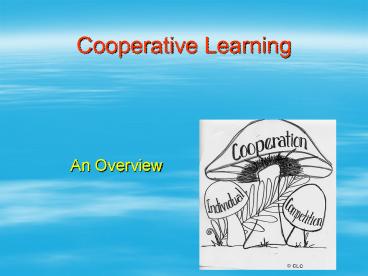Cooperative Learning - PowerPoint PPT Presentation
1 / 22
Title:
Cooperative Learning
Description:
Applied Social Psychology Intentional structuring of learning goals to promote Positive Interdependence ... Critical thinking and higher-level ... – PowerPoint PPT presentation
Number of Views:94
Avg rating:3.0/5.0
Title: Cooperative Learning
1
Cooperative Learning
- An Overview
2
Definition
- What it IS
- What it IS NOT
- Based on theory and work of Johnson and Johnson
3
Cooperative Learning is
- Applied Social Psychology
- Intentional structuring of learning goals
- to promote Positive Interdependence
- Intentional structuring of learning goals so that
students are encouraged to engage in Promotive
Interaction - Promotive Interaction is more likely to occur
when there are 5 key elements intentionally
structured and monitored throughout the lesson.
4
Learning Goals can be structured 3 different ways
- Cooperatively
- Competitively
- Individualistically
5
Competitive Learning Goals
- One person can obtain her goal if and only if the
other fail to obtain theirs - Negative Correlation Among Goal Attainments
- Negative Interdependence
- If I swim, you sink If you swim I sink.
- Individual Goals
- Comparative (Norm referenced) evaluation
- Winners are rewarded
6
Individualistic Learning goals
- Each persons goal attainment is unrelated to the
goal attainments of others - No correlation among goal attainments
- No Interdependence
- We are each in this alone.
- Individual Goals
- Evaluation is criterion referenced and may be
limiting. - Rewarded for own product.
7
Cooperative Learning
- When one person achieves his goal, ALL others
achieve their goals - Positive correlation among goal attainments
- Positive Interdependence
- We sink or swim together.
- Group Goal
- Evaluation is criterion referenced and
encouraging. - Rewarded for group product.
8
Interaction Patterns
9
Research Findings
- Achievement and retention
- Critical thinking and higher-level reasoning
- Differentiated views of others
- Accurate understanding of others perspectives
- Liking for classmates
10
Research Findings, cont.
- Liking for teacher
- Positive expectations toward future interactions
- Liking for subject areas
- Social Skills
- Psychological health
- Self-esteem
11
5 Key ElementsofEffective Cooperative Learning
Groups
- Positive Interdependence
- Individual Accountability
- Face-To-Face Interaction
- Direct Instruction of Social Skills
- Processing
12
Positive Interdependence
- Message from teacher
- Fates are tied together
- In your interest to help / be helped
- Encourages helping each other
- Without Positive Interdependence there may be no
motivation to cooperate.
- One set of answers from the group
- One worksheet
- Jigsaw materials (information)
- One set of materials / tools to share
- Bonus points
- Same grade for everyone
- Different colored pens
13
Individual Accountability
- The message the teacher gives to the students
that tells them - 1. You must do your fair share of the work.
- You must master the material being learned.
- You will be held accountable for your share of
the work and mastering the learning.
- Using signatures
- Individual Tests
- Different Colored Pens
- Spot Checking as Students Work
- Randomly Calling on Students
14
Face-To-Face Interaction
- The message that students
- have a group,
- need to work with their group,
- need to stay with their group,
- Work synchronously
- Sit at round tables so they can easily see and
hear one another. - Designated areas on the floor (islands)
- Space between the groups so the teacher can move
between groups. - Stay with your group.
15
Direct Instruction of Social Skills
- Intentionally teaching social skills like any
other skill. - Structure regular opportunities for students to
learn, practice and be evaluated on social skills
until they become automatic. - Establishing a need for the social skill
- Positively framing rules as skills
- Include Social Skills in each lesson
- T-chart (looks like / sounds like)
- Role Play what listening is and is not.
- Discuss how it feels to be listened to / ignored.
- Ask students to think of a time when they were
listened to. How did it feel?
16
Processing
- Thumbs up or Thumbs down
- Rate yourself
- What did someone in your group do / say that let
you know you were being listened to? - Observer gives data (feedback) Discuss
- Write an goal for improving / maintaining the
high quality of listening for tomorrows work. - Name 3 things your group did well in working
together. - Name 1 thing your group could do even better next
time.
- Intentionally structured time
- Reflect on how well we worked together / used our
social skills (social skills) - Reflect on how well we completed our work
(academic) - Review data,
- Make a goal for next time
17
(No Transcript)
18
Cooperative Learning Lesson Plan Components
- Lesson Objective
- Group Size
- Seating Arrangement (face-to-face)
- Assignment of Roles
- Materials
- Social Skills (directly taught)
- Statement of Task (positive interdependence)
- Evaluation (individual accountability include
social skills) - Processing (reflection, how well we worked
together, how well we mastered learning)
19
Formulating Objectives Making Decisions
- Specify Instructional Objectives
- Decide on Size of Group
- Assign Students to Groups
- Arrange the Room
- Plan Instructional Materials to Promote
Interdependence - Assign Roles to Ensure Interdependence / Support
Learning Social Skills
20
Structuring Task Interdependence
- Explain the Academic Task
- Structure Positive Goal Interdependence
- Structure Individual Accountability
- Structure Inter-group Cooperation
- Explain Criteria for Success
- Specify Desired Behaviors
21
Monitoring Processing
- Monitor Students Behavior
- Provide Task Assistance
- Intervene to Teach Collaborative Skills
- Provide Closure to Lesson
- Evaluate Quality and Quantity of Students
Learning - Assess How Well The Group Functioned
- Set Goals
22
- WHAT CHILDREN CAN DO TOGETHER TODAY, THEY CAN DO
ALONE TOMORROW. - Vygotsky, 1965































